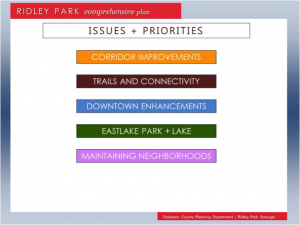The core document or “blueprint” of municipal development decision making is the comprehensive plan. This advisory document forms the basis for the zoning ordinance, municipal land use and policy decisions, and the acquisition of land for public use. Comprehensive plans are carefully crafted with input from professional planners, local officials, business owners, and residents. The process of drafting these plans can last up to 18 months, with the finished plan providing dozens of recommendations to help aid local officials with municipal initiatives. Throughout the extensive process of drafting a plan, the greatest challenge for planners is formulating a plan that is a relevant document for local officials; that is, securing a place for the plan on the desk of the borough or township manager where it is frequently consulted for day-to-day decisions, and not just sitting on a shelf gathering dust.
Community planners in the planning department have examined ways to develop comprehensive plans into engaging documents that will help and encourage local decision-makers to implement their recommendations and initiate growth or redevelopment. With help from the PA Department of Community and Economic Development (DCED), which has conducted outreach and seminars on restructuring plans, DCPD is currently working on comprehensive plans that are focused on important issues and priority projects that municipalities should address to maintain and/or enhance quality of life.
In these implementation-oriented comprehensive plans, chapters are not oriented solely around specific “elements” of planning (i.e. housing, transportation and land use), but are each constructed around a key issue – ranging from managing growth, business district and corridor revitalization, and protection of natural and recreational resources. The interconnected nature of community planning issues ensures that the core elements of planning are still addressed through discussion of these issues, thus meeting existing state requirements. The plans will continue to address existing conditions and future recommendations, but will be organized around implementable goals with prioritized recommendations that are imbued with the necessity of action. The aim of these comprehensive plans is to encourage and create the framework for the implementation of projects and initiatives that will most affect community residents, while concurrently outlining long-range planning needs. DCPD is currently working with Edgmont Township and Ridley Park Borough on “issue-oriented” comprehensive plans.
This blog post is adapted from the 17th issue of Delaware County’s Planning Matters Newsletter. Check out this newsletter and the archives for other great planning articles from DelCo! If you would like to be added to the Planning Matters subscription list so that you can receive the latest news about planning and development in Delaware County electronically, please contact Ron Aquilino, Data & Systems Coordinator, at aquilinor@co.delaware.pa.us with a request to subscribe.

